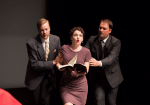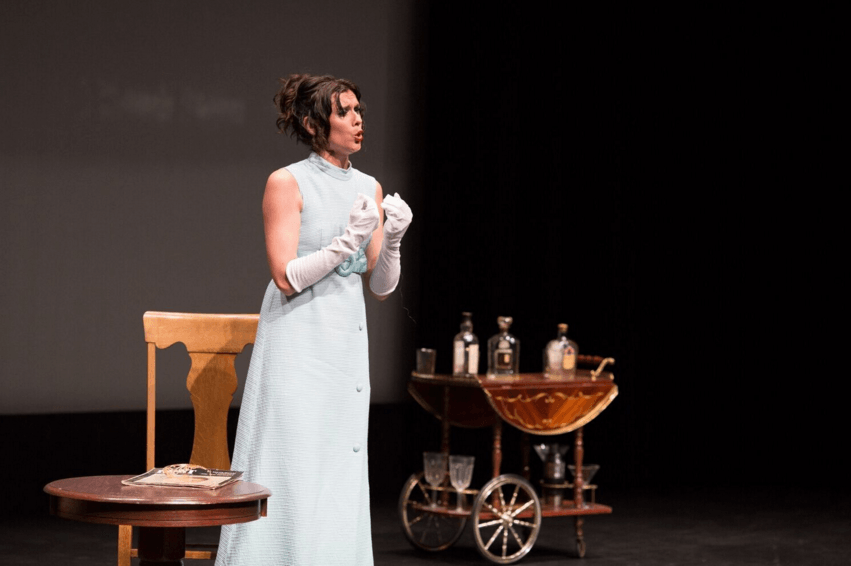Review by Michael Sobota, Photos by Chad Kirvan
Mozart’s The Marriage of Figaro, composed when he was 30, is one of his most popular operas. It ranks in the top three, together with The Magic Flute and Don Giovanni. A comic opera in four acts, the work requires seven strong principal singers, another four in strong secondary roles, and a mixed chorus including children/youth.
There were several remarkable aspects of Opera Northwest’s production. That it happened at all is a tribute to Theresa Thibert’s charm, musical skills, connections, and sheer perseverance. Thunder Bay has not seen a full opera staged in more than a decade. Thibert served as the producer, director, and sung Countess Almaviva, one of the principal roles, for this production.

(L to R) Kai Leinonen as Don Basilio, Olivia Whiddon as Susanna, Mark Ellis Gough as Count Almaviva
A decision to place the opera in modern times and dress worked just fine. Stripped down to its essentials, and performed on an almost bare stage, the focus was on the singing and Mozart’s marvelous music. The orchestral support came from five professional members of the Thunder Bay Symphony Orchestra: Martin Blanchet (bass), Sonya Nanos (cello), Thomas Cosbey, Michelle Zapf-Belanger, and Kathlyn Stevens (violin). Sean Kim was the musical director, conductor, and played harpsichord. The music was superbly played and a core strength of this production.
All of the principles shone strongly in their roles. Some of them were both excellent singers and stage actors. Evan Korbut (Figaro), Mark Ellis Gough (Count Almaviva), Olivia Whidden (Susanna), and Thibert all displayed both a strong understanding of their characters, solid stage presence and gave professional musical performances. Luke Donnelly sang with clarity and enthusiasm as Doctor Bartolo. Graydon McNally brought an authentic, rustic charm to Antonio, and sang with energy and focus. Very fine work was given by the chorus—all of their contributions had volume, clear diction and appropriate supportiveness. Overall, the entire ensemble was strong.
And yet, in the final analysis, this Marriage of Figaro was only partially successful. The decision to stage the work without full

(L to R) Theresa Thibert as Countess Almaviva and Mark Ellis Gough as Count Almaviva
sets worked fine artistically; however, mismatched furniture, while supportive of the acting, was a visual distraction. The performances were not ready. On opening night several of the cast awkwardly worked with their scores, openly, in front of the audience, and the production wasn’t genuinely funny.
With the musical strengths of this ensemble and the professional support from the orchestra musicians, this might have been a superb concert version of The Marriage of Figaro. If Opera Northwest learns from this premier production, gives themselves more time, and perhaps adds an independent stage director, their next production could be critically welcomed. The nearly full house on opening night proves there is an eager local audience for live opera.
Featured image caption: Theresa Thibert as Countess Almaviva














